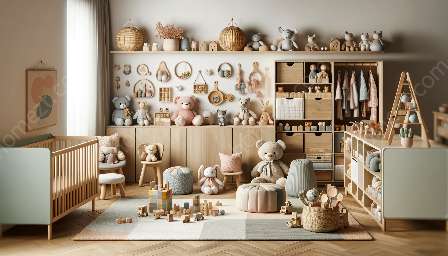When it comes to childhood development, puzzles and games play a vital role in nurturing cognitive, social, and emotional skills. In this comprehensive guide, we will delve into the captivating world of puzzles and games and their compatibility with toy selection and the design of a nurturing nursery and playroom.
The Importance of Puzzles and Games
Engaging in puzzles and games offers numerous benefits for children's holistic development. From boosting problem-solving abilities to promoting creativity and enhancing fine motor skills, these activities provide a wealth of learning opportunities.
Enhancing Cognitive Skills with Puzzles
Puzzles challenge children's minds by requiring them to think critically, analyze patterns, and use logical reasoning. As they fit pieces together to form a complete picture or solve complex puzzles, they sharpen their cognitive abilities and develop essential problem-solving skills.
Fostering Social Interaction through Games
Games, whether board games, card games, or group activities, encourage social interaction and collaboration. They teach children about teamwork, turn-taking, and sportsmanship, while also promoting communication and interpersonal skills.
Embracing Creativity and Imagination
Many puzzles and games spark creativity and imaginative thinking. Whether it's assembling a colorful jigsaw puzzle or inventing new rules for a simple game, children have the freedom to explore their creative potential and develop a sense of innovation.
Choosing the Right Toys for Developmental Play
When selecting toys for children, it's essential to consider how they contribute to overall development. Puzzles and games that align with a child's age, interests, and developmental stage can provide enriching experiences and hours of entertainment. Look for toys that stimulate various senses, encourage exploration, and promote skill-building.
Age-Appropriate Selection of Puzzles and Games
For nursery and playroom settings, it's crucial to offer a variety of age-appropriate puzzles and games. Catering to different developmental milestones and ensuring a diverse selection can help children progress and stay engaged in their learning journey.
Educational Toys and Playroom Design
Integrating educational toys and games into the design of a playroom fosters an environment that nurtures learning and creativity. Consider incorporating storage solutions to keep puzzles and games organized and easily accessible, creating a space that encourages independent exploration and play.
The Role of Puzzles and Games in Nursery Development
Within a nursery environment, puzzles and games contribute to the overall ambiance and functionality. Pairing toys with developmentally appropriate activities and ensuring a safe, stimulating play area can enhance the experience for both children and caregivers.
Structuring a Engaging Playroom for Developmental Activities
Organizing a playroom to accommodate puzzles and games involves creating zones that cater to different types of activities. Establishing dedicated areas for building, problem-solving, and imaginative play can optimize the space for a well-rounded developmental experience.
Conclusion
In conclusion, puzzles and games not only entertain children but also serve as invaluable tools for fostering their cognitive, social, and emotional development. By carefully selecting toys that align with developmental goals and creating nurturing play environments, caregivers can enhance children's learning journeys while providing enriching and joyful experiences. Dive into the world of puzzles and games, and witness the transformative power they have in shaping children's early years.



